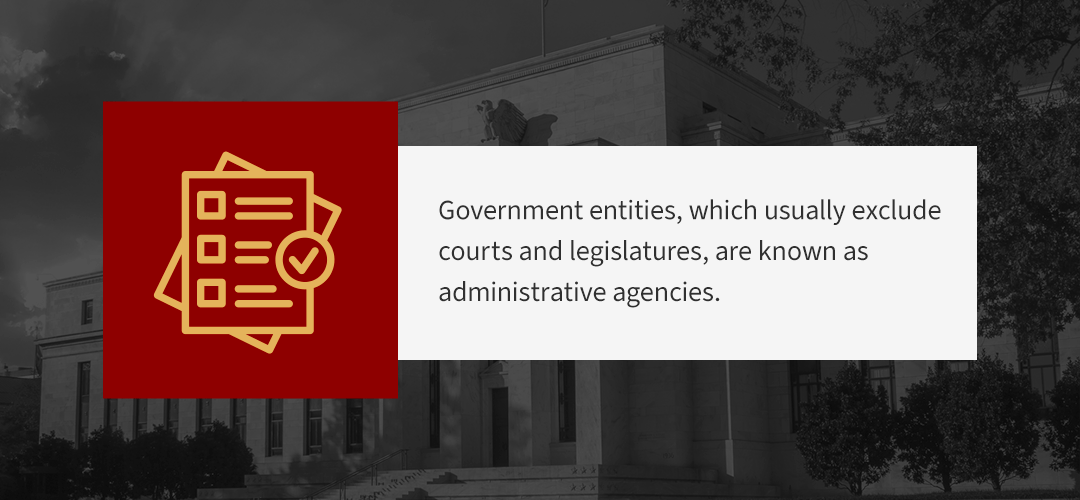Challenging a government agency’s decision can be critical for land developers and property owners when you’re running important business operations and construction projects. While government regulations are important and aid the people, there are instances when state and federal administrative agencies make decisions that bar construction projects or prevent business opportunities.
When you need a lawyer to challenge a government agency decision in Boston, Massachusetts, our administrative law attorneys at Calabrese Law Associates may be able to help. We have a wide range of experience with construction and real estate law and vast knowledge of the latest administrative policies to help you resolve issues quickly and keep your project on track. If you believe you have a valid reason for an appeal, schedule a consultation with us so we can learn more about your situation.
Understanding Administrative Law
Administrative law refers to how parts of the government system make decisions. These government entities, which usually exclude courts and legislatures, are known as administrative agencies. They are found in the government’s executive branch and work through the day-to-day details of governing, being assigned specific tasks by the legislature. These agencies make various decisions and supervise the procedures that come from their decisions.
Some examples of agencies with decision-making power include the Social Security Administration (SSA), the Environmental Protection Agency (EPA), and the National Transportation Safety Board (NTSB). An example of administrative law being carried out includes Congress tasking the SSA with the administration of the nation’s Social Security program. The SSA makes general social security policies and processes terminations or individual applications for Social Security benefits.
Common Reasons for Administrative Appeals
Companies may have an appeal when they believe the government agency’s response was caused by an “adverse determination.” An adverse determination is generally when the agency denies all or part of a request. You may file an appeal when you believe the agency’s response had the objective of causing one of the following:
- Delaying the project
- Withholding some or all records
- Charging excessive fees
- Denying fee waiver, expedited processing, or preferred fee status
- Rejecting a particular request
- Conducting an inadequate search or providing a “no records” response
- Providing a glomar response — neither confirming nor denying
- Coming to a decision that will impede access to records
Of course, these reasons alone are not enough to create an administrative appeal. You must provide further reasoning and proof that the agency performed these actions due to an adverse reason or misunderstanding. For instance:
- The withheld information fits within one of the nine Freedom of Information Act (FOIA) exemptions.
- The agency delayed its response beyond the statutory time limit.
- The agency had a misunderstanding about whether the requested records were operational files or not agency records.
- The agency made an improper decision to charge fees.
When Should You Make an Appeal?
The response letter you receive should include an exact deadline for filing an appeal. If it does not provide information about appeals, you may be able to check the agency regulations for one. Most agencies will provide a deadline of between 30 and 90 days after the date of the agency’s denial letter.
How an Administrative Lawyer in Massachusetts Can Help
When you suspect a government agency did not properly consider your request, it helps to fully understand the latest administrative laws that govern them. Beyond simply solving your current issue, monitoring changes to existing regulatory policies can help you avoid similar issues in the future.
Fortunately, administrative law attorneys can guide companies through the appeals process and offer proactive legal support with regulatory compliance services. These services are designed to monitor regulatory changes and compare them against company decisions to help prevent issues before they arise.
Our administrative law and regulatory attorneys in Massachusetts are highly skilled and knowledgeable in regulations regarding government agencies. At Calabrese Law Associates, we provide dispute resolution and negotiation services, representation in administrative hearings, and tailored strategies for regulatory adherence. We help you comply with local, state, and federal regulations while protecting your interests.
Process of Challenging a Government Agency Decision
If you believe the agency made an adverse determination, you may still appeal even if the agency has not directly stated in the denial letter that you have appeal rights. Filing an appeal causes the agency to look at the request again, although this time, a different agency employee may look at it with more discretion. You’ll generally follow these steps when challenging a government agency decision:
- Hire an administrative law attorney: An administrative lawyer can be a valuable asset in these situations. They can guide you through the process, ensure you submit all the relevant documents, and include important and accurate information.
- Draft a statement of appeal: In your letter, clearly state that you are writing a statement of appeal. Provide background details about the initial request and agency denial. The letter will be easier to follow if you identify the date of your request and the denial, the agency tracking numbers, copies of the correspondence, and a brief description of the requested or withheld material. Highlight both legal and common sense arguments in support of the appeal, supporting documentation — such as new articles and documents that prove your point — and your contact information.
- Appeal the decision in court: This step will only be necessary if you do not receive a reasonable response. However, you can only appeal in court if you have already appealed through the agency’s review process and exhausted all the agency’s administrative procedures. It’s important to consider whether this step will be worthwhile for you and the project involved. For instance, you might take the issue to court if the withheld information is crucial to your project. To appeal in court, you’ll need to prepare a complaint for judicial review. This document identifies the decision you are appealing and your grounds for appealing it. You should also prepare a civil action cover sheet and the relevant filing and summons fees.
- Receive the court’s decision: The court may decide the action was unreasonably delayed or unlawfully withheld, agree with the agency’s decision, modify the agency’s decision, or return the matter for further proceedings before the agency.
Why Trust Calabrese Law Associates
Calabrese Law Associates comprises numerous lawyers who regularly represent construction and real estate industry clients in transactional and litigation situations. We put our clients first and apply our local expertise to provide Massachusetts-specific legal advice to produce suitable results for our clients so they can keep their projects moving. Here are a few reasons to consider our administrative attorneys at Calabrese Law Associates:
- Expertise: Many of our skilled lawyers have worked closely with state legislators in Massachusetts as legislative aids and staff members. This experience makes our attorneys highly familiar with the legislative process and government agencies’ scope of administrative authority. Paired with our litigation department expertise, our attorneys have the skills to advise clients, represent them, and help them make well-informed decisions.
- Knowledgeable: Our lawyers regularly update clients on pending or new government regulations and administrative policy changes. We do this to protect our clients’ best interests and ensure they take the necessary steps to work around these changes.
- Accessibility: Our attorneys maintain consistent communication with our clients and remain accessible because our clients are our number one priority.
Work With an Administrative Law Attorney From Calabrese Law Associates
At Calabrese Law Associates, our administrative lawyers aim to advise and assist clients efficiently, effectively, and properly to influence positive results. If the agency could have made an adverse determination, we’ll help you create a tailored strategy based on your particular situation and reason for the appeal. If you need assistance with your administrative law dispute in the Greater Boston Area, contact our knowledgeable team today.
This publication and its contents are not to be construed as legal advice nor a recommendation to you as to how to proceed. Please consult with a local licensed attorney directly before taking any action that could have legal consequences. This publication and its content do not create an attorney-client relationship and are being provided for general informational purposes only.
Attorney Advertising. Prior results do not guarantee a similar outcome.




